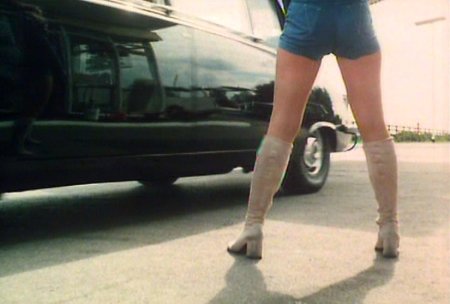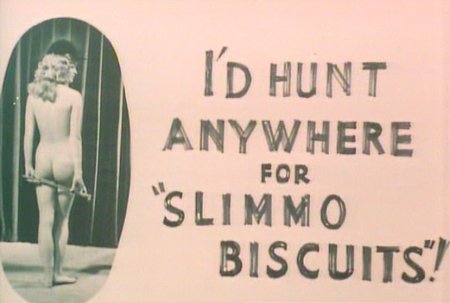The Magnificent Seven Deadly Sins
This film reminded me of why I love the Seventies output of the British film industry so much; even when the film is flawed, it's still a fascinating period piece, with smudgy colour, and at least one woman in hotpants.

'The Magnificent Seven Deadly Sins' seems like it was a really good excuse for producer and director Graham Stark to get as many celebrity mates as possible to write and appear in a film. Graham gets a wide variety of writers, including himself, to write a sketch each about one of the famed Seven Deadly Sins, and managed to get a respectable number of stars to appear, including Bruce Forsyth, Ronnie Barker, Joan Sims, Bernard Bresslaw, Roy Hudd, Harry H Corbett, Harry Secombe, June Whitfield, Spike Milligan and Alfie Bass. All of these give the performances you would expect (apart from Bruce Forsyth, whom I didn't expect to be so good), with a fantastic turn by Harry H Corbett, hoping to pick up a girl. Because of the nature of the subject matter, it was perhaps inevitable that this is not so much a film, but a series of sketches. Films that don't have a consistent narrative structure often get a bad press, but I quite like them, which I guess is why 'The Meaning of Life' is my favourite Python film.
Although the sketches are of varying quality, and the announcement of the writing team at the start of each one tells you all you need to know, they're all worth watching, and some, like 'Sloth', written (and starring) Spike Milligan, are excellent. In fact, Stark seems to almost revel in the freedom that not having a consistent structure gives you, starting the film off with a scantily clad girl wondering through woodland, taking her slip off and basking in the beauty of nature. The director pops up (make up your own jokes), animated by Bob Godfrey Pictures, and informs us that this scene has little to do with the rest of the film. He then introduces the credits, chiding the projectionist for showing as many random images as possible into the sequence. The directing also varies rather alarmingly throughout the film, with 'Lust' perhaps being the high point, possibly because Harry H Corbett really gives a performance Graham can get his teeth into. It's also the one piece written by Graham himself, so perhaps we can't discount the director's pride in his own work. None of the directing is truly appalling, but it's telling that the direction in 'Lust' really holds your attention compared to the other sketches.

In any case, we start with 'Avarice', starring Bruce Forsyth, and written by Bob Larbey and John Esmonde. It's a fascinating period piece, with, not one, but several women in hotpants, but even the appearance of Joan Sims can't save this from being a bit dreary. Bruce does his best as a chauffeur to a tightwad of a businessman, but the slowness of the whole piece isn't helped by a fairly pointless appearance by Bernard Bresslaw. Bernard does what he's been paid for (every time John and I witness the line "I only arskd!" from him, we shout "Thanks Bernard! You can go home now!"), but he's given an uninspiring part, as has everybody else. However, you get to see a petrol pump attendant and Green Shield stamps, which is enough to make me watch it again, although you might have other ideas. The animated links between the features are short, restricting themselves to introducing the sketches, so we don't have long to wait for 'Envy', written by Dave Freeman and starring Harry Secombe. This is a nice story about a couple, having won the pools, being determined to buy a particular house, but, again, it's a little too slow for its own good. The performances from Harry, June Whitfield and Geoffrey Blaydon are all fine, but the punchline smacks of the writer thinking "How am I going to get out of this one?". I can't help but think that this could have been a far more entertaining farce than it was, despite Harry Secombe's rather inept blacking up (Don't ask. No, really.).

Never mind. Graham Chapman and Barry Cryer give us a fascinating sketch for 'Gluttony', starring Leslie Phillips, directing his trademark sexual harassment towards food, with a rather good performance by Julie Ege. The ending can be seen a mile off, but it's great fun getting there. Next, we have 'Lust', written by Graham Stark himself, based on a story by Marty Feldman, and it's a great sketch. It stars Harry H Corbett, and it's a tribute to Harry that you really hope that the ending won't turn out as you expect. Harry's monologue runs for the first half of the sketch, and although he's basically performing Harold Steptoe, it doesn't make you warm to him any less. Bill Pertwee puts in a nice appearance, and there's a lovely tube set (I assume it's a set, I'm not good at this type of thing) to boot. Harry even attempts to light the cigarette of the girl sitting beside him on the train. I wonder what being a non-smoker was like in 1971? It's certainly extraordinary to think you could smoke on underground trains until 1984...
Next up is 'Pride', written by Galton and Simpson (interestingly credited as Simpson and Galton), and is of the quality you would reasonably expect from these two masters of comedy, and is a delightful sketch about the drivers of a Rolls Royce and a vintage car meeting in a narrow country lane, and both refusing to back up. I thought putting the working-class couple in a clearly prized vintage open-top car was a bit unrealistic (surely a Ford Anglia might have been better?), but the performances from Alfie Bass and Ian Carmichael are marvellous, with the contemptous wives taking a picnic whilst their husbands argue. Also, watch out for the continuity error with the radiator grille of the Rolls Royce at the end...

However, I should probably save the best until last, which the film doesn't, sadly, ending with the interesting, but ultimately disappointing, 'Wrath', also written by Graham Chapman and Barry Cryer, starring Ronald Fraser and Stephen Lewis. Ronald is one of two old men who vow to take their revenge on the local park keeper. I bet you can't guess who plays the park keeper, can you? It's amusing enough, with the interest being in the fairly unusual plotline. It's not often you see two old men bent on murder, and the ending would satisfy any good Christian. The best, Sloth, written by and starring Spike Milligan, is very, very, good, filmed in the style of a silent movie, and showing people who simply can't be bothered. It was the sketch I laughed at the most, and I marvelled at the sheer cleverness of the concept and the writing. It also features a most enjoyable performance from Ronnie Barker, making me wish that the more unusual aspects of his career could be released on DVD, as well as the better known stuff. Peter Butterworth and Marty Feldman also put in enjoyable performances. This sketch is Spike showing exactly why he was one of the most respected British comedy writers of the 20th Century, and it's a joy to see.
This film is by no means a classic, but it's the sort of film which would struggle to get made today, which is a great shame, because, if nothing else, it shows how interesting the comedic talent of the era could be, in writing and performance. Don't expect laughs all the way through this film, but do expect to be fascinated. I'm amazed it got released on DVD at all, but I think we should all be grateful.
This article was first published in kettering.
About this entry
- By Tanya Jones
- Posted on Thursday, July 24 2008 @ 4:00 pm
- Categorised in Film, Review
- Tagged with comedy
- 3 comments

This is only £3.99 at Play, incidentally. You can’t go wrong for that price.
It’s certainly not a perfect film, but it is at the very least interesting, with some lovely performances. And the Sloth segment really is very good indeed.
By John Hoare
July 26, 2008 @ 1:27 am
reply / #
Fucking amazingly, Film 24 (Sky channel 157) are showing this RIGHT NOW.
By John Hoare
July 11, 2009 @ 12:24 am
reply / #
Yes, and Leslie Phillips’ office feast is making me very hungry.
By Cheeseford
July 11, 2009 @ 1:02 am
reply / #